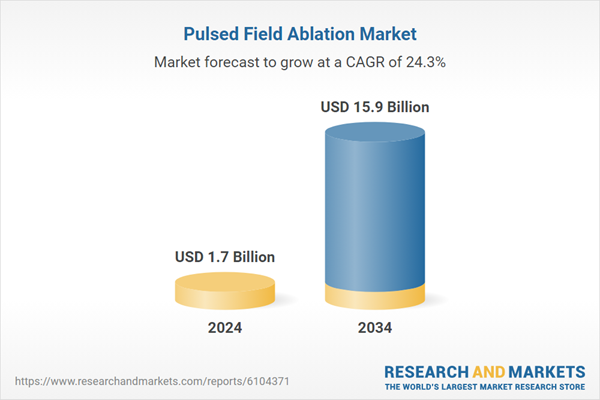Pulsed-field ablation utilizes high-voltage electrical pulses to create irreversible electroporation (IRE), which leads to cell death and tissue scarring. The technique’s non-thermal nature offers a significant advantage over heat-based methods, as it minimizes damage to surrounding tissues, making it more appealing for both practitioners and patients.
The growing integration of robotic-assisted pulsed field ablation (PFA) procedures, coupled with the use of advanced imaging technologies, is significantly elevating the precision and efficiency of ablation treatments. Robotic assistance allows for greater control and accuracy during PFA procedures, enabling electrophysiologists to target specific areas of the heart with minimal disruption to surrounding tissues. This precision is particularly beneficial for patients with complex arrhythmias, where traditional methods might present higher risks or lower success rates. Moreover, robotic systems reduce the physical strain on healthcare professionals, improving their ability to perform procedures over extended periods with enhanced comfort.
The catheters segment generated USD 569.1 million in 2024, making it a dominant player in the pulsed-field ablation (PFA) market. These catheters are specifically engineered to deliver high-voltage electrical pulses to target tissues, enabling precise tissue ablation with minimal damage to surrounding areas. As disposable consumables, these catheters are crucial to the continued functionality and growth of the PFA industry, ensuring that they are regularly replaced and replenished, particularly in high-volume electrophysiology centers and hospitals. The ability of these catheters to improve both the safety and effectiveness of PFA procedures has contributed significantly to their demand and adoption in clinical practice.
The hospitals segment accounted for a 44.1% share in 2024. This dominance is largely due to the high frequency of cardiac surgeries performed in hospitals, where advanced surgical infrastructure and well-trained medical teams are available. Hospitals have long been at the forefront of utilizing innovative medical technologies, including PFA, to treat patients with complex arrhythmias. Their ability to conduct intricate procedures and provide post-operative care makes them key players in the PFA landscape, ensuring widespread adoption of this technique. With the increasing patient volume and advancements in surgical techniques, hospitals are expected to remain a major contributor to the market's growth.
Europe Pulsed Field Ablation Market was valued at USD 792.4 million in 2024. Europe’s progress is fueled by the active participation of numerous academic institutions and specialized cardiac centers in pivotal clinical research, which has accelerated the adoption of PFA technologies. The region benefits from robust regulatory support, including streamlined approval processes, which allow new technologies like PFA catheters and generators to reach healthcare providers more quickly. Additionally, Europe’s focus on minimally invasive electrophysiological techniques is expanding the adoption of PFA, particularly as it aligns with growing trends toward less invasive, highly precise treatments for arrhythmias.
Key players in the Global Pulsed Field Ablation Industry include Abbott, Boston Scientific, CARDIOFOCUS, Johnson & Johnson, and Medtronic. Companies in the pulsed-field ablation market are focusing on enhancing their product portfolios by introducing advanced PFA catheters and generators, while also working on improving the overall safety and efficacy of their devices.
These players are investing in clinical trials and research to prove the benefits of PFA technology over conventional treatments. Collaborations with hospitals and academic institutions are key strategies, as they facilitate the adoption of innovative technologies. Additionally, regulatory approvals, such as CE marking in Europe, have expedited the market entry of new products, enhancing global reach.
Comprehensive Market Analysis and Forecast
- Industry trends, key growth drivers, challenges, future opportunities, and regulatory landscape
- Competitive landscape with Porter’s Five Forces and PESTEL analysis
- Market size, segmentation, and regional forecasts
- In-depth company profiles, business strategies, financial insights, and SWOT analysis
This product will be delivered within 2-4 business days.
Table of Contents
COMPANIES MENTIONED
The companies featured in this pulsed field ablation market report include:- Abbott
- Boston Scientific
- CARDIOFOCUS
- Johnson & Johnson
- Medtronic
Table Information
| Report Attribute | Details |
|---|---|
| No. of Pages | 130 |
| Published | June 2025 |
| Forecast Period | 2024 - 2034 |
| Estimated Market Value ( USD | $ 1.7 Billion |
| Forecasted Market Value ( USD | $ 15.9 Billion |
| Compound Annual Growth Rate | 24.3% |
| Regions Covered | Global |
| No. of Companies Mentioned | 6 |









